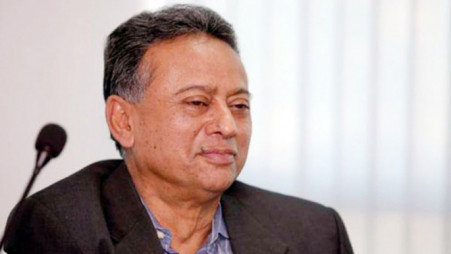BNP Standing Committee member and former Commerce Minister Amir Khasru Mahmud Chowdhury has warned that Bangladesh is heading towards a state of uncertainty due to the interim government’s disregard for democratic transition and constitutional obligations.
“The interim government is ignoring all necessary steps for a democratic transition,” he said at a dialogue titled “Policy Reforms and the Upcoming National Budget,” organised by Citizen’s Platform at a hotel in Dhaka’s Gulshan area on Monday.
“As a result, the country is heading into uncertainty. In such a state, neither the national budget nor any economic policy will be effective.”
The event was attended by key figures from civil society and policy institutions, including Anisuzzaman Chowdhury, special assistant to the chief adviser, and Debapriya Bhattacharya, distinguished fellow of the Centre for Policy Dialogue (CPD), who presented the keynote paper.
Khasru emphasised that it is the government’s primary responsibility to steer the country towards democratic reform.
“Where are we going as a nation? What lies ahead for Bangladesh? How long will this government remain? When will elections be held? What will happen after the election? These are questions that every citizen is asking. We are not seeing any certainty on these fronts,” he said.
He criticised the formulation of the upcoming national budget, claiming it is based on “questionable GDP figures” and continues the trend of fiscal policy seen under what he termed the previous “fascist” government.
“Nothing substantially different has been done. We must ask how much consideration has been given to the current domestic and global economic context in preparing this budget,” Khasru said.
His remarks come at a time when Bangladesh is preparing to announce its national budget for the fiscal year 2025–26, amid inflationary pressure, sluggish foreign reserves, and slow export growth.
Critics, including economists and opposition leaders, have raised concerns over data reliability and a lack of structural reforms in the budget-making process.
Referring to reports that Bangladesh is considering establishing a humanitarian corridor with Myanmar, Khasru termed the issue “sensitive” and questioned how such a politically significant decision could be taken by an unelected interim administration without consulting stakeholders.
“This is a political matter. How can the interim government make such decisions without any dialogue with relevant parties?” he asked.
The corridor discussion has arisen amid ongoing tensions and a humanitarian crisis on the Bangladesh–Myanmar border, especially following armed conflict in Rakhine State and the displacement of civilians.
Amir Khasru highlighted that the people of Bangladesh have made sacrifices for over 14 to 15 years to restore democratic governance through free and fair elections. He referenced the large-scale protests in July last year as part of the opposition’s demand for electoral reform.
“People have shed blood and made sacrifices for democracy. But today, the interim government is doing everything except preparing for elections,” he said.
Khasru also criticised what he described as excessive regulatory control over trade and commerce in Bangladesh. “Compared to other countries, Bangladesh is over-regulated. We have seen in the past how this overregulation has led to corruption and looting. The more you impose control, the more scope you create for misuse. We need to break out of this cycle,” he said.
He outlined his vision for Bangladesh’s future economic model, stating, “‘We are open for business’ should be the new model for the economy. We must reduce unnecessary regulation and foster an environment conducive to investment and entrepreneurship.”
Concluding his remarks, Amir Khasru stressed the need for political tolerance as a prerequisite for economic progress. “We must learn to be tolerant. We must respect differing views and paths. Without political reform to accompany economic change, we cannot move forward. It’s time we move away from confrontational politics,” he said.
His statements add to the growing chorus of concerns from opposition leaders and civil society members urging the interim government to clarify its position on elections and ensure a transparent democratic process.


